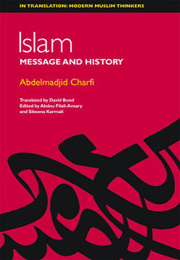Introduction by Moncef Ben Abdeljelil
Published online by Cambridge University Press: 12 September 2012
Summary
Abdelmadjid Charfi, the author of this book (published in the English translation under the auspices of the Aga Khan University, Institute for the Study of Muslim Civilisations in London), is one of the most outstanding researchers in the field of religious studies and Islamic thought. He is one of a few thinkers distinguished for their deep insight, their rigorous methodology and their sound analysis. His accurate interpretation is grounded in detailed knowledge of the original sources and careful reading of contemporary insights in the humanities and sociology. Charfi has closely followed developments in this wide and complex field with its multiple perspectives – and many potential pitfalls.
Abdelmadjid Charfi was born in the Tunisian city of Sfax in 1942 and initially attended a Qur'anic school before going to the Sadikia secondary school in Tunis, where a programme of modern education was inaugurated in both French and Arabic. Tunisian reformist and modernising thought developed within this school, which also nurtured the elite who led the new, independent Tunisia and founded its educational, legislative and cultural institutions. Abdelmadjid Charfi belonged to the first generation of students at the Higher Institute for Teacher Training in Tunis, one of the most important institutes of higher education, founded along the lines of the École Normale Supérieure in Paris. This rigorous intellectual training enabled Charfi to pursue his studies in France. After graduating with distinction from the Sorbonne he taught at the University of Tunis.
- Type
- Chapter
- Information
- IslamBetween Message and History, pp. 1 - 24Publisher: Edinburgh University PressPrint publication year: 2009



